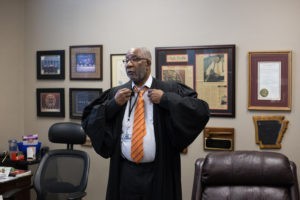The Arkansas Supreme Court on Thursday refused to bar a Little Rock judge from handling cases involving the office of the state attorney general who in 2017 got him removed from execution cases after he demonstrated against the death penalty in his extrajudicial role as a Baptist pastor.

Judge Griffen dons his clerical robe. He never uses his gavel because no one ever doubts who is the judge in his court room. (File photo by Brandon Markin)
Justices rejected a request by Attorney General Leslie Rutledge to bar Pulaski County Circuit Judge Wendell Griffen from hearing all cases in which her office participates by a 4-3 vote without comment.
Two years ago Rutledge initiated the complaint that got Griffen, pastor of New Millennium Church in Little Rock, barred from cases involving the death penalty or the state’s lethal injection protocol.
After ruling against the state in a property dispute alleging that prison officials illicitly obtained a drug to use in a series of planned executions, Griffen joined fellow church members in an anti-death penalty prayer vigil outside the governor’s mansion on Good Friday in 2017.
Though dressed in street clothes and not wearing anything to identify himself as a judge, journalists covering the rally recognized Griffen and published photos of him lying motionless on a cot. Griffen explained he was posing as a dead man “in solidarity with Jesus, the leader of our religion, who was put to death by crucifixion by the Roman Empire.”
Griffen insisted that being in public service does not require him to surrender his right to exercise his faith and that his religious views on the death penalty are irrelevant to his ability to rule impartially on matters of law. The Supreme Court of Arkansas nevertheless issued an order barring the judge from presiding over any case involving the death penalty, capital punishment or the state’s method of execution.
The attorney general asked the Supreme Court to expand Griffen’s ban to all cases involving her office in a petition filed in September after he ruled against the state in a licensing dispute over medical marijuana.
Griffen refused the state’s request to dismiss an appeal by Carpenter Farms, the only minority-owned applicant for the state’s first round of licenses to grow medical cannabis. The Arkansas Medical Marijuana Commission rejected the Carpenter Farms application because of an error on the form. News media later reported that one of the winning applicants made the same error, but it apparently was not noticed during the approval process.
Rutledge claimed that Griffen is biased against her lawyers and was rude to a senior assistant attorney during a hearing in the marijuana permit case. Griffen responded by inviting reporters to his courtroom, where he played an audio recording of the hearing. Griffen admitted to being a tough judge but claimed nothing in his cross examination of the attorney rose to a level of “injudicious conduct.”
“When Judge Griffen takes the bench, he is well-prepared, and he expects the same of all lawyers before him,” Griffen’s attorney, Mike Laux, said on social media Dec. 5. “It is not complicated.”
The Arkansas Supreme Court declined in September to restore Griffen’s authority to hear death penalty cases, saying his petition for rehearing was improperly filed. Justices earlier refused Griffen’s request to recuse themselves from the case.
The Arkansas Judicial Discipline and Disability Commission dismissed an ethics complaint against Griffen in June.
Previous stories:
Arkansas Supreme Court, Attorney General, continue to tangle with pastor/judge
Judge Wendell Griffen wants power to hear death penalty cases restored
Report: Ethics complaint against anti-death penalty pastor/judge dismissed
